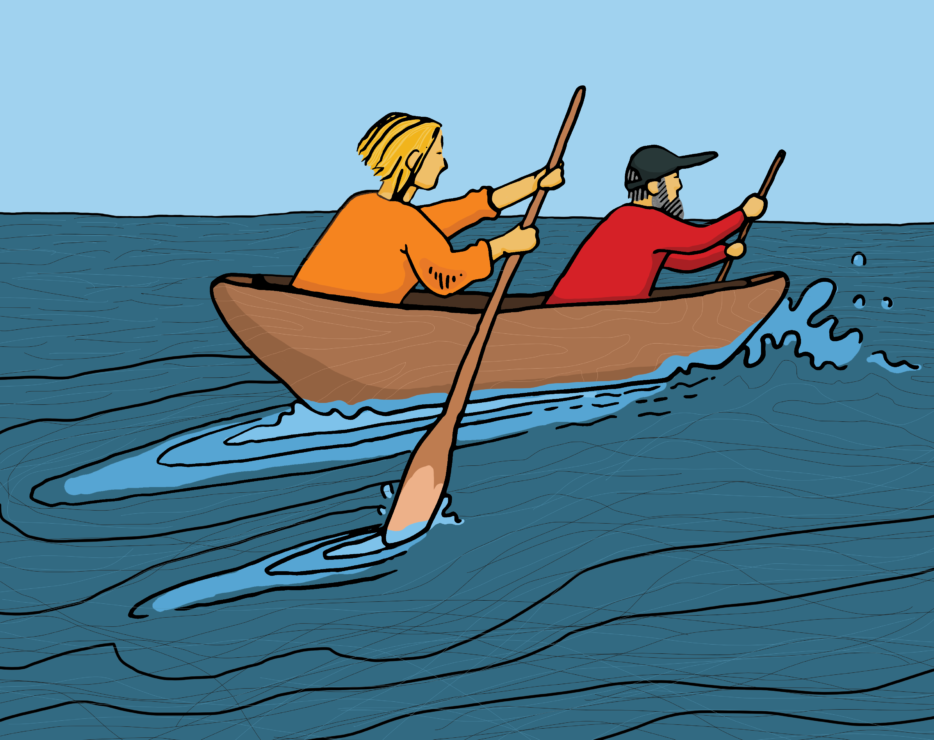Barred from using a motor, Chris and Marty Fagan will stop past Victoria enroute to Ketchikan, Alaska in extreme paddling competition

The sky’s a picturesque powder blue, seagulls are flying overhead, and wind splashes the water of Lake Washington against the side of her Hawaiian canoe when Chris Fagan gazes towards the towering buildings in the distance and reaches for her ringing cell phone.
“Hopefully the connection is okay. If I drop you I can give you a call back, but we’re heading towards Seattle so cell service should be pretty good,” says Fagan, who juggles watching for oncoming boat traffic with answering my questions.
When you’ve climbed over 20 000 feet to the summit of Denali in Alaska, received a Guinness World Record for a self-guided ski crossing of Antarctica, and completed multiple 100 mile races, answering questions while keeping watch for her paddling teammates — her husband Marty and friend Danny Geiger — on Washington State’s second largest natural lake is light work.
On June 3, the Seattle-based team will make up one of 46 teams racing for $10 000 from Port Townsend, WA to Ketchikan, AK in the 1200 km “Race to Alaska” (R2AK) boat race.
The R2AK is North America’s longest human and wind powered boat race, and is broken into two stages: Port Townsend to Victoria, and Victoria to Ketchikan. Any type of boat can enter, the only rule being it cannot have an engine.
The race is just the latest challenge for this adventurous couple, who were made famous five years ago for skiing over 900 km from Antarctica to the South Pole without a guide.
Training for the ski trip took them more than three years, and Fagan believes the time it took to visualize and prepare for all kinds of scenarios played a huge role in completing the life-changing journey—which she narrated in her first book, The Expedition, set to be released in September.
“I think one of the biggest things is making sure in training you put yourself in these kind of situations that you may encounter on the real race day,” said Fagan. “So when you’re in that down moment in the race you almost draw upon that ‘I can do this because [I’ve] felt this before,’ ‘I’ve been here before.’”
After their South Pole trek, Fagan admits she was mentally and physically exhausted and recharged by pouring her time and energy into learning how to writing her book, before embarking on another major journey.
“In the middle of that, we were looking for another thing that we could do that would be a fun, unique adventure that wouldn’t take us too far away. Because the South Pole was a two month adventure, and we didn’t want to be gone that long,” she says.
“[The R2AK] kind of fit all the criteria as far as a really fun adventure, we could learn something new, it’s right in our backyard, and we can be gone [for only] a few weeks.”
The Fagans knew they had experience navigating the seas, but starting in January, they blocked off every Friday from their full-time jobs — Marty works at a tech company in Seattle, while Chris runs a consulting company — in order to train and prepare for the race.
“Almost every Friday we were trying to get out onto the water … for as long as possible, so usually we would meet at 9 a.m. and wrap up [at] about three or four [p.m.],” said Fagan.
The team will ride their personal sailing canoe made by Nick Beck, a Hawaii-based designer of outrigger canoes. Chris says they flew out to the Hawaiian Island of Kauai to meet Beck, now in his 80s, and were told his canoe will give them special luck in the race.
“He’s always wanted to do this race, but now he’s 80ish. When he heard we wanted to do it and he heard our background, he started really connecting with us and he decided to sell us his personal boat,” says Chris.
“We’ve since learned, from a lot of people who are much more embedded in the paddling community, that it’s really good juju to get a boat from somebody that has this legendary life on the water.”
Chris believes there is a “really outside chance they could be competitive.” As they are one of the smaller boats in the race, their performance will depend largely on the wind.
However, Chris and her team reiterate that their main goal is to give it their all and enjoy the ride on the waves up north to Alaska.
“We’re going to try out best, with our skills, and have a lot of fun,” she said.
A previous version of this article incorrectly stated that the Fagans had 10+ years of experience as kayak guides. We apologize for this error.







